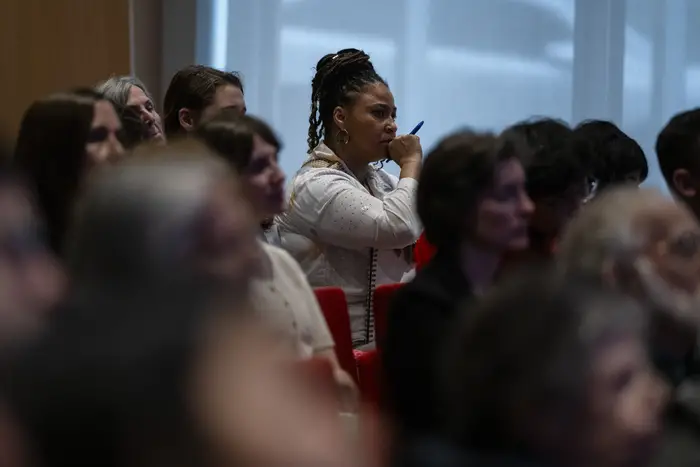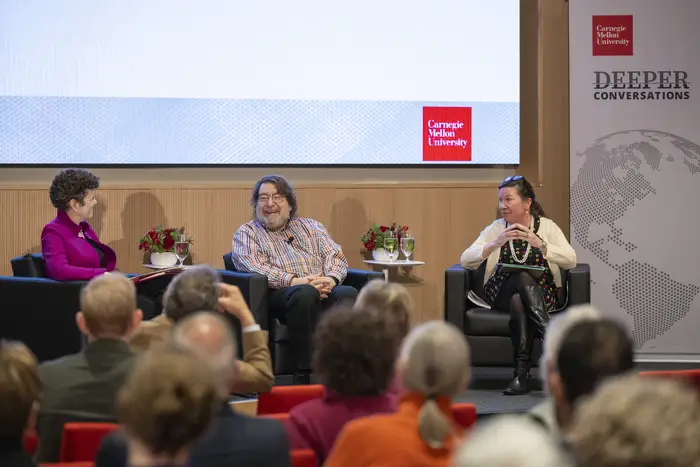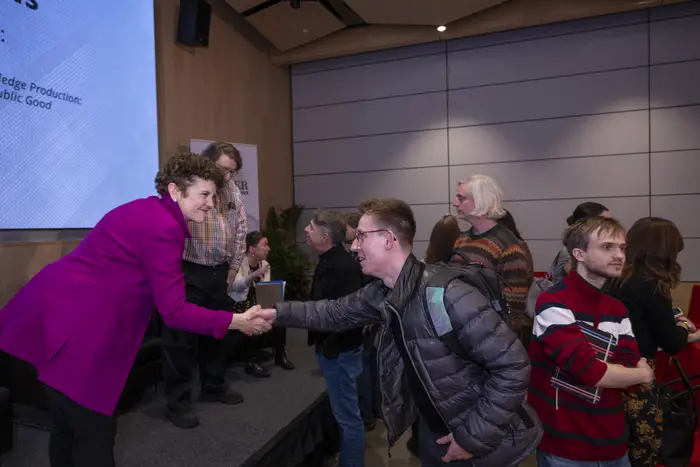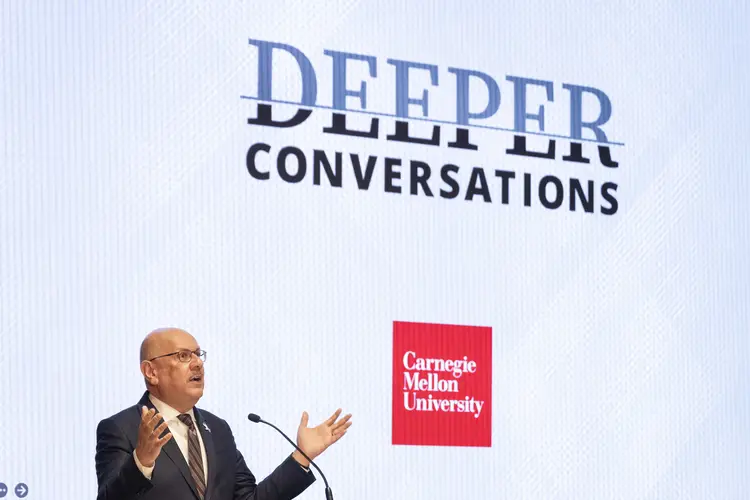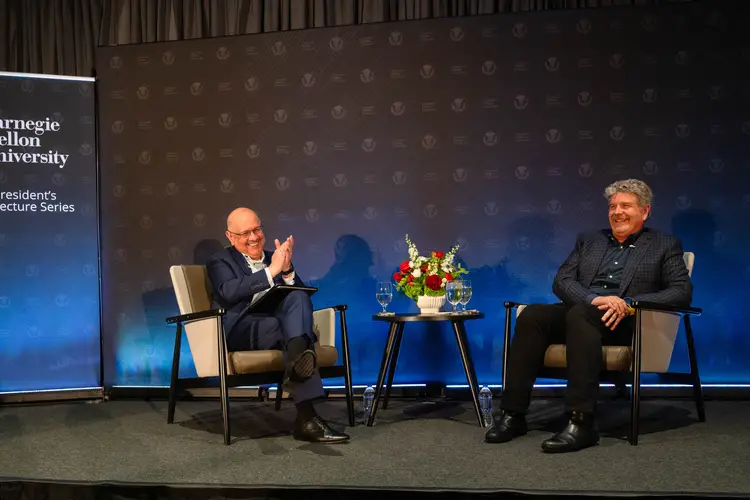



Deeper Conversations Explores the Role of the Federal Government In Producing Innovation
Theresa Mayer(opens in new window), vice president of research at Carnegie Mellon University, outlined the bond between American universities and society in terms of a social contract to begin the third and final spring event of CMU’s Deeper Conversations initiative(opens in new window).
Throughout the history of the United States, institutions of higher education have been shaped by, drawn their agenda from and been responsible to the community, she said, citing a piece (opens in new window)by James Duderstadt, then-president of the University of Michigan, that explained the federal government’s role in that social contract.
“Each generation established a social contract between the university and the society it serves,” Mayer said. “Although the constitution grants power over education to the states, the federal government has played an important, if not dominant, role in defining the nature of the social contract with universities.”
Introducing the April 21 event, Carnegie Mellon University President Farnam Jahanian(opens in new window) acknowledged his message to the campus community(opens in new window) in late March regarding the federal government’s funding cuts targeted at higher education.
“Across higher ed and beyond, we’re witnessing a time of profound change, challenges that test us and opportunities that demand our boldest ideas,” he said.
Carnegie Mellon’s response to these challenges are grounded in three principles: maintaining academic and research excellence, supporting CMU’s people and community, and securing the long-term sustainability to advance the university’s mission.
“These guideposts allow us to evolve while preserving the strength and values that make CMU a world leader,” Jahanian said.
Government’s relationship with universities is a social contract for an ‘Endless Frontier’
Mayer said the way government currently funds research began in 1940.
President Franklin Roosevelt dedicated the National Institutes of Health to “life conservation, rather than to life destruction” and he appointed Vannevar Bush, an electrical engineer, to coordinate and mobilize American science during World War II, Mayer explained.
In July 1945, Bush submitted a report called, “Science: The Endless Frontier,” which proposed organizing government support to allow university faculty to engage in research of their own choosing “with the expectation that significant benefits would accrue to society in the forms of national security, public health and economic prosperity, and very importantly, to use this research enterprise to educate the next generation of scientists and engineers,” Mayer said. “This is a true partnership … one in which we both co-invest into the success of science.”
Fast-forward to 1980, when Congress passed the Bayh–Dole Act, which became another significant milestone in the social contract between universities and the federal government. The law allowed universities the right to own inventions made under federally funded research.
“The results were staggeringly positive and this was a driver of innovation,” Mayer said.
Erica Fuchs(opens in new window), Kavčić-Moura Professor of Engineering and Public Policy and director of the Critical Technology Initiative(opens in new window), said private companies are now more reliant on university research than any other time in history.
“There are new ways to think about our research with other countries, our research with industry and our research with government if we are going to continue to advance ‘The Endless Frontier,’” she said.
If the social contract with the federal government continues to change, progress and innovation may be more difficult, said Alison L. Barth(opens in new window), Maxwell H. and Gloria C. Connan Professor in the Life Sciences.
“There's just no question in my mind that if you pull back from that investment, we will make fewer discoveries,” she said. “There's just no question.”
She gave examples “built on incremental discovery after incremental discovery” of research now being applied to migraine and diabetes treatment that began in the 1980s.
“We don’t know what we’re going to find,” she said. “We just want to find things that are true, and when we find them, we want to use them to benefit human health, but that means you can’t always predict them.”
Through his own experience, Ariel Zetlin-Jones,(opens in new window) associate professor of economics in the Tepper School of Business(opens in new window), related explaining the value of higher education to observing a reluctance around blockchain and cryptocurrencies research.
“What we have had to do is communicate the value of basic research to private businesses that are interested in investing in this space, communicating to them the role we can play, even if it has a longer-run perspective,” he said. “If it pushes us a bit to be more outward in how we describe the value of fundamental basic research, maybe I wouldn't call it a silver lining, but it's something we can do.”
Martial Herbert(opens in new window), dean of the School of Computer Science(opens in new window), agreed on the importance of communicating the impact and value of research, especially to those outside communities of higher education.
Earlier in the conversation, he compared the overall challenges in funding changes to those once faced in the mid-1990s when the Defense Advanced Research Projects Agency (DARPA), made a major change in its funding model, shifting from basic research to mission-driven research.
“Somebody here (at Carnegie Mellon) at the time mentioned, ‘maybe this is an opportunity, maybe we’re not paying attention enough,’ with researchers taking it for granted and relying on funding in certain ways,” he said, adding that he’s noticed a shift in conversations with investors from private industry away from one-sided demands toward partnerships.
For federal government, crisis makes change easier
During the first event of the spring Deeper Conversation series, “The History of the Role of Government: Expansions, Reductions and Shaping the Nation,” on March 20, Christopher Phillips(opens in new window), department head and professor of history in the Dietrich College of Humanities and Social Sciences(opens in new window), said historians conceptualize the role and scope of the federal government in different ways that continue to evolve.
“One of the central questions in American history is the relationship between voters, special interest groups, and the responsiveness — or non-responsiveness — of the federal government to voters and interest groups,” he said.
In the late 18th century, the key motivating factor for founding the federal government was to avoid coercion from distant governments. Phillips explained that a founding principle of the U.S. system of federalism is that “the further away the government is, the more likely you’re to be coerced by it” so the Constitution served as a way to explicitly outline the powers of the federal government and the three-branch system.
“The federal government continues to grow, at least in financial size, without major changes to the Constitution,” he said. “States continue to be more and more dependent on federal funding, while technically reserving and retaining the ability to control the lives of their residents.”
Karl Maschino(opens in new window), Distinguished Service Professor of Public Policy and Management in the Heinz College of Information Systems and Public Policy(opens in new window), said a phrase he’s heard only in Washington, D.C., remains true when it comes to spending: Never waste a crisis.
“That sounds really crass, particularly in an emergency, but what it really gets to is this issue of how difficult change is and it's in those moments of crisis that change is possible. And change is easier,” said Maschino, who also served as a former chief financial and administrative officer and co-chief risk officer of the U.S. Government Accountability Office.
Trust in America’s role in the world takes time
At the April 17 event focused on “America's Role in the World,” Audrey Cronin(opens in new window), director of the Carnegie Mellon Institute for Strategy & Technology(opens in new window) (CMIST), said the extent to which the American public supports retrenchment in domestic affairs created by this presidential administration depends on how much people believe there is a risk in engaging with other countries.
“I believe engagement is critical, but we’re fooling ourselves if we don’t understand American history and where the deep political legacy and belief in retrenchment comes from,” she said. “It’s part of our culture and our legacy.”
Restoring trust in the United States from the rest of the world could come from foreign investments in manufacturing and other industries that the administration wants to emphasize, but that process does not move quickly, said Mark Kamlet(opens in new window), University Professor of Economics and Public Policy and Provost Emeritus at CMIST.
“These things take a very long time,” he said. “The issue is that the investor is only going to make the investment if there is no uncertainty and if there's trust about what's going to happen in the future.”
Sarah Mendelson(opens in new window), Distinguished Service Professor of Public Policy and Director of Sustainable Futures in the Heinz College, agreed, adding that rebuilding that trust could take a generation.
Representation, whether through the United Nations, NATO or elsewhere, has to be humble, listening and responding to concerns, she said.
“Showing up in people's countries is really important,” Mendelson said. “Showing up in people's missions is really important.”
Cronin said relying on the younger generation, especially through education initiatives and privately funded fellowships for Americans abroad, is important for the future.
“If we can't change things instantaneously right now, if you believe that we should be more engaged … our hope is in our young folks,” she said.
For future series themes, CMU is committed to address challenging discourse
Established in 2024 by Jahanian, Deeper Conversations is a university-wide initiative aimed at promoting the power of civil discourse, to engage members of the Carnegie Mellon community in studying and discussing some of the most complex challenges facing society today. Past themes(opens in new window) have also explored democracy and the U.S. presidential election as well as the crisis unfolding in the Middle East.
This spring the Deeper Conversations initiative examined the historical evolution of the government’s role in American life; its influence on funding, shaping and disseminating knowledge; and the evolving impact of soft power on global stability.
The series is meant to be engaging without advocating for any particular position or side, as Richard Scheines(opens in new window), the Bess Family Dean of the Dietrich College of Humanities and Social Sciences(opens in new window), said on March 20 to introduce the first event. It concentrated on the “History of the Role of Government: Expansions, Reductions and Shaping the Nation.”
“As a university, we are set up to educate students about complex and controversial ideas, not really to try to argue with one voice for the community that's now tens of thousands,” Scheines said. “We are here to eliminate the pros and cons, to explore the background of these issues, to bring out the nuance rather than to hide it with slogans, and to discuss things in a safe, rational and respectful manner.”
To conclude the final event in the series, Scheines emphasized once more that the series came from a desire to tap into the expertise of Carnegie Mellon faculty to better understand the nuances surrounding current events.
“We said, let's turn our attention to educating, providing information for people, and not advocating,” he said, asking the audience for feedback and ideas for the next topics in the series.
He echoed what Jahanian said earlier in the afternoon, when he discussed how to increase trust in higher education by remaining committed to accessibility and relevance in order to address challenges that face the Carnegie Mellon community.
“We created this series because we know that in an increasingly fractured world, these conversations are so crucial,” Jahanian said, “We all benefit from these opportunities to learn, reflect and broaden our perspectives.”
